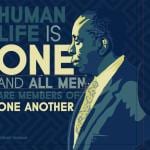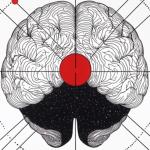The Adventurous Lectionary – The Seventh Sunday after Pentecost – July 7, 2024
2 Samuel 5:1-5, 9-10
Psalm 48
2 Corinthians 2:2-10
Mark 6:1-13
This week, I am focusing on the New Testament passages and their emphasis on the role of faith to transform our lives and enable us to face creatively even those realities that cannot be changed and, as activist Angela Davis asserts, change the realities we cannot accept. Limitation is the womb of possibility and divine healing can occur even in challenging situations. Possibility gives birth to protest and creative transformation, opening us to a way forward where we previously saw no way ahead. God’s presence in the world is non-coercive. Sometimes the most highly evolved, such as Paul, and God’s beloved child, Jesus cannot produce a “miracle,” but work persuasively and patiently in the context of the limits they face. Faith opens the door to the flow of divine healing energy; unfaith can diminish the impact of God’s presence. While our faith does not entirely determine our welcome, it is a factor in the multifactorial process of heath and illness.
The words of 2 Corinthians 12 portray the relationship between mysticism, humility, faithfulness, and divine assurance. Our experiences of holiness enable us to find wholeness and grace in what Episcopalian spiritual guide Alan Jones calls life’s unfixables. Paul describes the mystical experience of an early Christian, most likely himself, who encountered the Holy and was given access to paranormal information. Paul doesn’t describe the nature of this mystical experience but asserts that it involved encountering certain divine truths beyond the scope of everyday experience. It almost sounds like the “near death experience” that many persons claim to have experienced in recent years. He also notes that mystical experiences can tempt their recipients to a type of pride, which separates them from other followers of Jesus. Paul goes on to say that despite his own advances in the faith, an ailment was “given” to him to keep him humble and remind him of his unity with all humanity. We are all mortals, finite, and imperfect, depending on God’s grace for our healing and wholeness, indeed, everything of importance in life. The saint is saintly precisely because he or she is connected with humankind in all its wonder and pain. (see Bruce Epperly, “Mystics in Action: Twelve Saints for Today,” Orbis, 2020)
Paul’s “thorn in the flesh” torments him. While the nature of this ailment is unknown to us, it is a reminder in its vagueness that all of us may face conditions from which there is no escape spiritually or physically. Our spiritual experiences do not deliver us from our fallibility and mortality. We still must face limitations even if we are privy to experiencing the face of God. We must experience God within life’s trials and not by avoiding them. Naturally, of course, Paul seeks relief from this ailment, but the ailment remains. Paul’s ailment and desire for divine cure raises a number of unanswerable questions: Is it God’s will that Paul continues to suffer? Is it simply an intractable chronic ailment? Or are some things beyond our faith to change? Are there some that’s that “God can’t” do, to use the language of theologian Thomas Jay Oord. Could God have delivered Paul from his ailment, and chose not to?
Paul receives a healing word in the midst of his incurable ailment. He isn’t cured but he experiences the peace that passes understanding. God’s grace is sufficient. God’s power and love is present in Paul’s weakness. Within the unfixable situations of life, we can experience grace and healing; we can experience God’s nearness and out of that sense of nearness witness to others, not in our superiority but in our dependence. We may not experience a cure, but we can experience a healing.
Paul is advocating a theology of interdependence in this passage. We can’t make it on our own. We need power and wisdom – yes, a love – greater than ourselves to face life’s greatest challenges. Our strength is not in rugged individualism but graceful relationships in which our responses to God’s call and the support of others give us greater power than we would have on our own. God is in the process and the relationships, and companionship with God brings healing and vocation.
Mark 6 portrays a curious encounter with Jesus’ hometown neighbors. They believe that they “know” him and can’t imagine how he, the carpenter’s son, can uniquely represent God. Accordingly, they have low expectations from this familiar local craftsman that seem to block Jesus’ healing power. Yes, Jesus can cure some, but the divine energy, present in the encounter with the demon-possessed man, the man lowered from the roof the woman with the flow of blood, and Jairus’ daughter, is minimized by their lack of faith. Their lack of faith places limits on Jesus’ power. Healing is synergetic: it involves the interplay of divine call and human response. We need to heal the person and community alike. (For more on the healings in Mark’s Gospel, see Bruce Epperly, “Healing Marks: Healing and Spirituality in Mark’s Gospel.”)
Faith opens the door to bursts of divine energy. Faith awakens us to new perceptions and an openness to divine power that enables God to be more present in our life. Unfaith can close off certain divine possibilities. While we cannot assert a linear one-to-one relationship between faith and well-being or sickness, faith makes a difference. Trust is a factor in well-being and spirituality and physical transformation. This passage suggests another set of questions: How important is our faith in shaping our health and the health of others? Is faith part of a larger matrix of causes that can limit the outcomes of our prayers? Does our faith shape, positively or negatively, what God can do in our lives? Is there a partnership between our faith and the form and power of divine activity in our lives and the world?
We can’t control God’s power or intentionality, nor can we ensure that our prayers will effect changes in body, mind, spirit, and relationships. Limitation is part of life and that includes Jesus, as well as popular televangelists who claim to heal virtually everyone who appears on their television programs.
After Jesus’ hometown encounter, he sends his disciples out on a preaching mission. They are to go forth in simplicity, without provision, trusting God to supply their needs. They must recognize that they are not in control of others’ responses. God is at work in their – and our – lives, inviting them forward in faith, but God cannot coerce belief or trust even when it is for our own good. They are not to dwell on failure or the indifference or skepticism of others, but trust God alone for the harvest. They must travel light and this means dispensing with any spiritual or emotional baggage that might stand in the way of their calling as Christ’s followers.
Faith transforms our lives. It is not magic or linear, or omnipotent. Still, faith opens the door to new vistas of divine inspiration and energy that can change our cells as well as our souls and enable us to face the unfixable with grace and trust. Within limits we face individually and as congregations, we can receive divine guidance for the pathway ahead.
+++
Bruce Epperly is a pastor, professor, and author of over eighty books, “Jesus: Mystic, Healer, and Prophet,” “Process and Politics,” Spirituality, Simplicity, and Service: The Timeless Wisdom of Francis, Clare, and Bonaventure,” and “The Elephant is Running: Process and Open and Relational Theology and Religious Pluralism.” His most recent books are “The God of Tomorrow: Whitehead and Teilhard on Metaphysics, Mysticism, and Mission” and “Head, Heart, and Hands: An Introduction to St. Bonaventure.”















